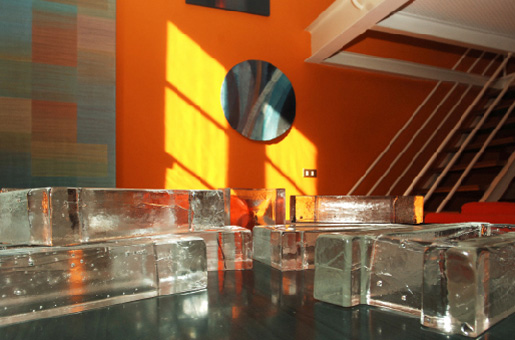1.7
“On my desk I still have the first examples that we created:
Starting from the solid glass block in its pure and classic form, we’ve removed material, we’ve added material, and we’ve created curved joints, inclined surfaces, and dry geometry.

The results sit here before my eyes and every day I discover something new about them.
Touch is a precious ally: I pass my hand over the glass surface and become aware of the sensuality of the soft curves that reveal the clever manual craftsmanship that makes each piece unique and unrepeatable.
The extraordinary nature of the glass blocks is that of their being single individual elements that proclaim small details of uniqueness, whilst at the same time are available to be combined in a humble and obedient way with another ten, hundred, even a thousand pieces, giving rise to a series of infinite combinations.
I take them in my hands and hold them up against the light and am amazed by the images that meet my eyes, images that mutate according to the thickness of the mass, its shape and the different finishes used.
The light shines through the glass, creating a spectacle that’s full of suggestiveness, made up of reflections and of unexpected and constantly changing ricochets of light.
The mass of glass captures the ray of light, imprisons it for an imperceptible instant and then set sit free again into the aeriform space.
It is fascinating to think that this infinitesimal fraction of is able to offer visual perception of intense emotional value and at the same time quantifiable, and that can be brought back to a scientific parameter, that of the index of refraction of glass.
Its average value is 1.7.
Paolo Balzanelli